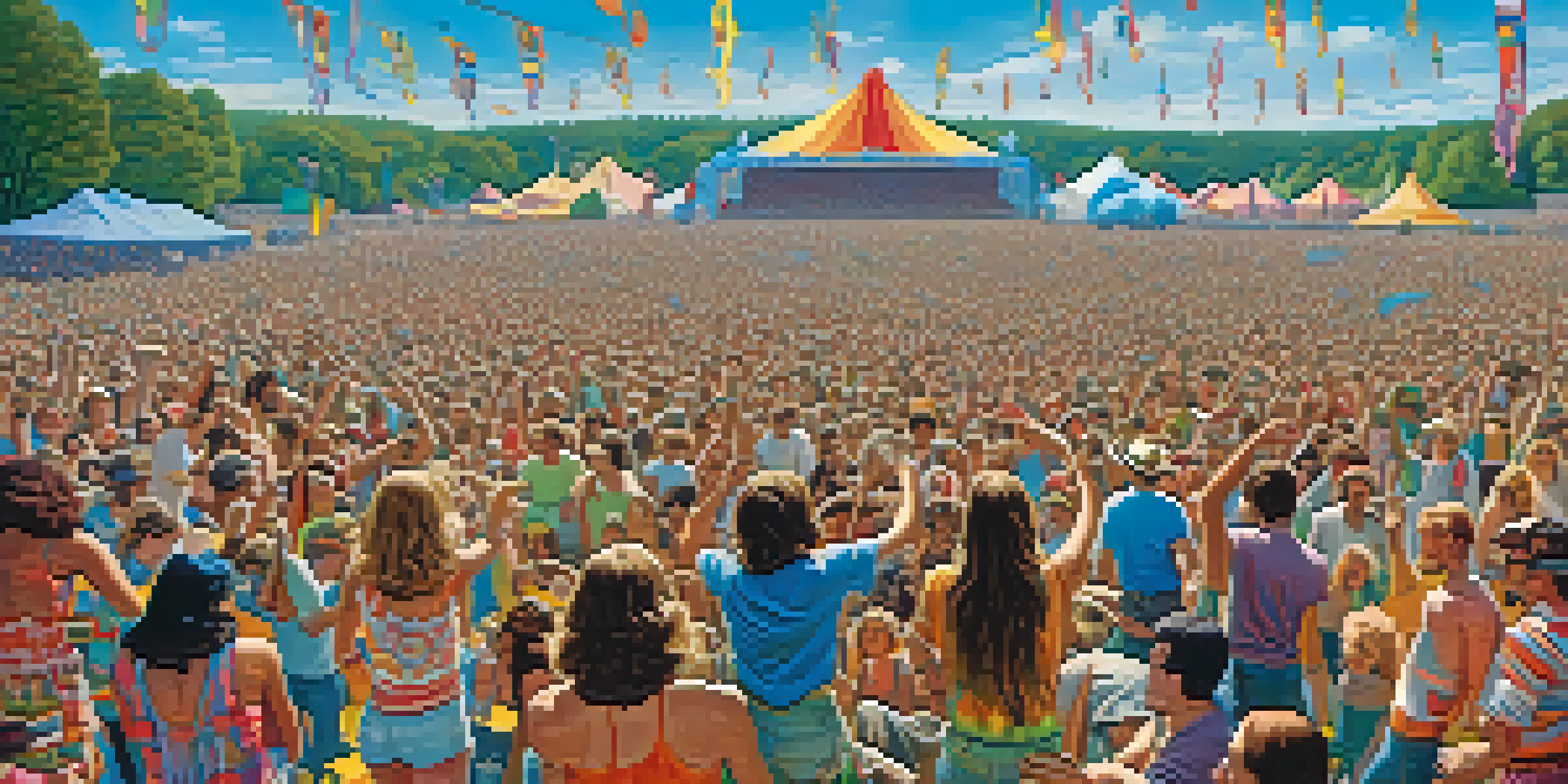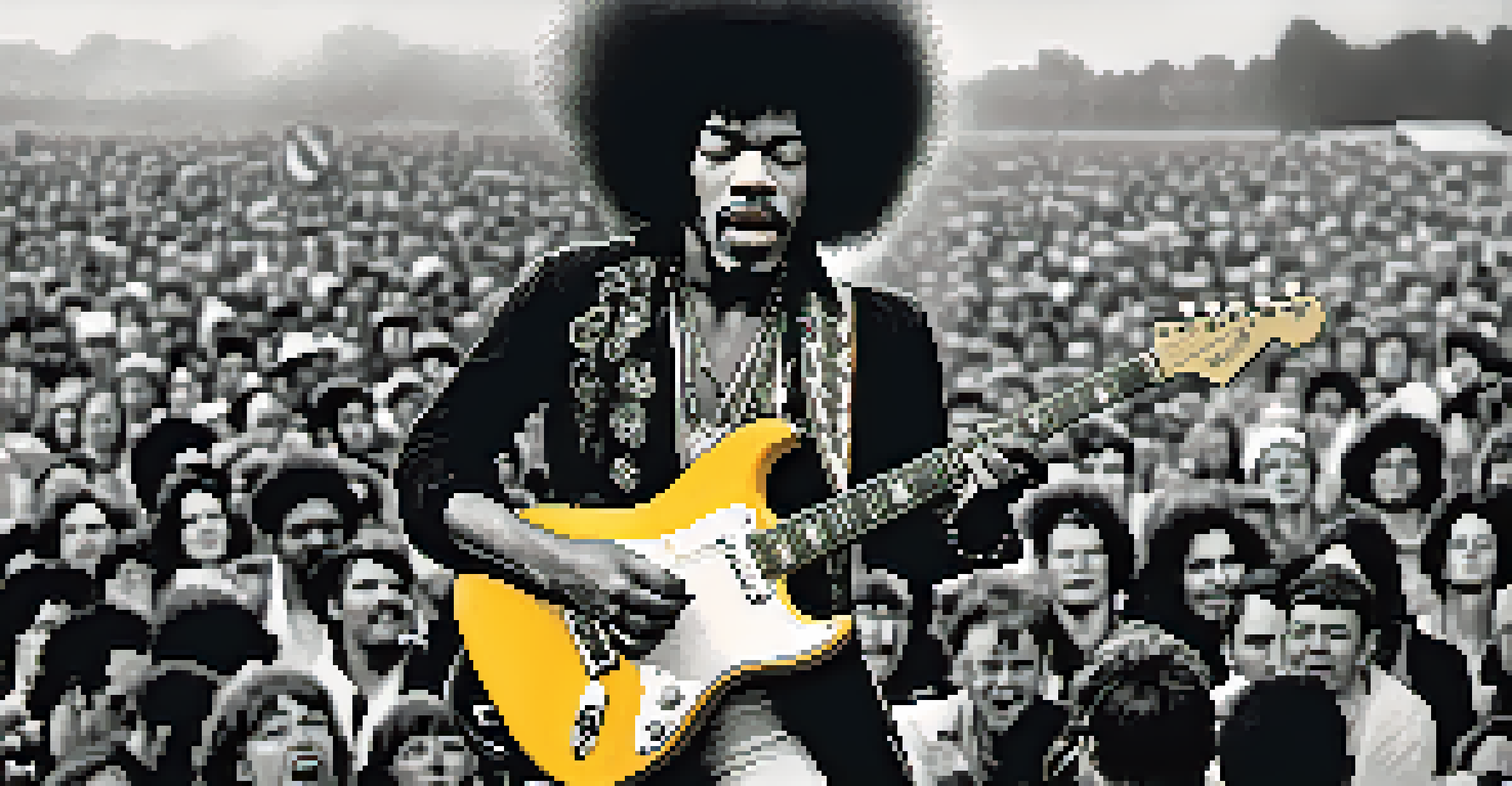Woodstock: The Festival That Changed the Face of Music

The Birth of a Cultural Phenomenon in 1969
Woodstock emerged in the summer of 1969 as a beacon of peace and music, uniting a generation. Initially planned as a profit-making event, it quickly transformed into a symbol of the counterculture movement. The festival was promoted as 'Three Days of Peace & Music,' reflecting its ethos amidst the social upheaval of the time.
The music is the message, and the message is the music.
Held on a dairy farm in Bethel, New York, Woodstock attracted nearly half a million attendees, far exceeding expectations. Artists like Jimi Hendrix, Janis Joplin, and The Who took the stage, creating unforgettable performances that would echo through history. This gathering was not just a concert; it was a collective experience that transcended music.
The festival's spontaneous and communal spirit highlighted the desire for peace during a tumultuous era marked by the Vietnam War and civil rights struggles. Woodstock became a microcosm of the 1960s counterculture, promoting messages of love, harmony, and social change. Its legacy continues to influence artists and festivals worldwide.
Iconic Performances That Defined a Generation
One of the most memorable aspects of Woodstock was its lineup of legendary performers. Jimi Hendrix's rendition of 'The Star-Spangled Banner' remains an iconic protest against the Vietnam War, encapsulating the spirit of the festival. Other unforgettable acts included Joan Baez, Sly and the Family Stone, and Crosby, Stills, Nash & Young, each contributing to the event's rich tapestry.

These performances weren't just musical showcases; they were powerful statements reflecting the hopes and frustrations of a generation. Artists used their platforms to address pressing social issues, blending art with activism. This fusion of music and message resonated deeply with audiences, leaving a lasting imprint on the cultural landscape.
Woodstock: A Movement for Peace
The festival became a symbol of the counterculture movement, promoting messages of love and social change during a time of significant social upheaval.
The emotional energy and raw talent displayed at Woodstock set a new standard for live music events. The festival proved that music could unite people across divides, creating a sense of community and belonging. The legacy of these performances continues to inspire artists and fans alike.
The Role of Peace and Activism at Woodstock
Woodstock was more than just a music festival; it served as a rallying cry for peace and activism. The event unfolded during a time of significant social upheaval, with protests against the Vietnam War and a growing demand for civil rights. Attendees embraced the festival's message of non-violence, demonstrating a collective yearning for change.
We are stardust, we are golden, and we've got to get ourselves back to the garden.
The festival's organization emphasized these themes, promoting peace and love as core values. Despite the challenges of inclement weather and overcrowding, attendees maintained a spirit of camaraderie and mutual respect. This sense of unity was a powerful reminder of the potential for collective action.
Woodstock's legacy as a platform for social change continues to resonate today. It inspired subsequent generations to engage in activism and use their voices for justice. The festival's commitment to peace remains a guiding principle for many music festivals and movements around the world.
Cultural Impact: Shaping Music and Society
The impact of Woodstock on music and culture is immeasurable, reshaping the landscape of rock and pop music. It ushered in a new era of music festivals, setting a precedent for large-scale gatherings that celebrate art and community. The festival's emphasis on diversity and inclusivity encouraged artists to explore new sounds and themes.
Moreover, Woodstock gave rise to the 'live album' phenomenon, with many performances recorded and released for fans to cherish. These albums showcased the raw energy of live music and solidified the festival's place in history. Bands and artists looked to Woodstock as a benchmark for their performances, aiming to recreate its magic.
Legacy of Iconic Performances
Performances by legendary artists like Jimi Hendrix and Janis Joplin not only showcased musical talent but also served as powerful statements reflecting the hopes and frustrations of a generation.
The festival also contributed to the broader cultural conversation about youth identity and expression. It symbolized a shift towards valuing creativity, individuality, and self-exploration in a society often defined by conformity. Woodstock helped legitimize music as a powerful form of expression and social commentary.
The Legacy of Woodstock in Modern Music Festivals
Woodstock's influence can be seen in the myriad of music festivals that followed, from Coachella to Glastonbury. These events often draw inspiration from the spirit of Woodstock, emphasizing community, artistic expression, and social responsibility. Festival-goers today still embrace the ideals of peace and love that Woodstock exemplified over five decades ago.
Many modern festivals also prioritize inclusivity and diversity, creating spaces for voices often marginalized in the music industry. This commitment to representation mirrors the ethos of Woodstock, where diverse artists came together to share their music and messages. The festival set a precedent for future events to follow suit in promoting equality and social justice.
Additionally, Woodstock's legacy persists through the ongoing dialogue about music's role in activism. Artists today continue to use their platforms to address social issues, echoing the sentiments expressed at Woodstock. The festival remains a touchstone for anyone advocating for change through the power of music.
Challenges and Controversies Surrounding Woodstock
Despite its many successes, Woodstock faced significant challenges and controversies that shaped its narrative. The festival struggled with logistical issues, including food shortages, inadequate sanitation, and overcrowding, which led to a chaotic atmosphere. These challenges highlighted the complexities of organizing such a large event, especially one rooted in ideals of peace and community.
Moreover, the portrayal of Woodstock in media narratives often focused on the chaos rather than the spirit of unity that permeated the festival. While the negative aspects were undeniable, they overshadowed the profound connections made among attendees. This dichotomy raises questions about how we remember and interpret historical events.
Inspiration for Future Festivals
Woodstock's influence continues to shape modern music festivals, emphasizing community, inclusivity, and the role of music in activism.
In later years, attempts to recreate Woodstock have sparked debates about commercialism versus authenticity. Some argue that the essence of the original festival has been lost in the pursuit of profit. These discussions remind us that while Woodstock was a moment in time, its legacy continues to provoke thought about the intersection of music, culture, and commerce.
How Woodstock Continues to Inspire Future Generations
The spirit of Woodstock lives on, inspiring new generations to embrace music as a catalyst for change. Today’s youth continue to gather at festivals, drawing on the ideals of creativity, community, and activism that Woodstock embodied. This enduring legacy encourages them to engage with social issues and express their values through music.
Organizations and movements inspired by Woodstock emphasize the importance of collective action and social responsibility. Initiatives that promote environmental sustainability, equality, and mental health awareness often draw parallels to the festival’s original mission. This connection reinforces the idea that music can be a powerful tool for positive change.

Moreover, the stories and experiences shared by those who attended Woodstock serve as a reminder of the power of unity. As we look to the future, it's clear that the lessons learned from this iconic festival will continue to resonate, motivating individuals to create their own movements for change. Woodstock remains a timeless symbol of hope and inspiration for all who seek to make a difference.